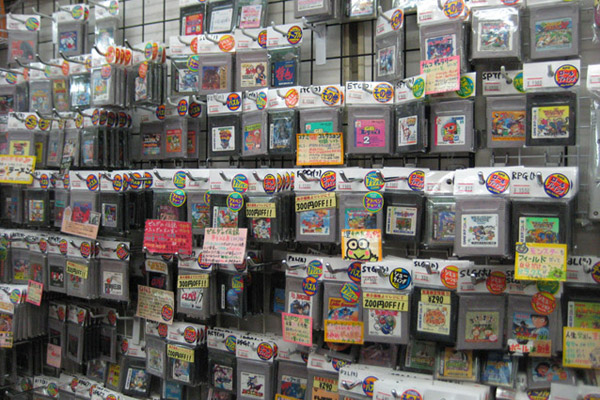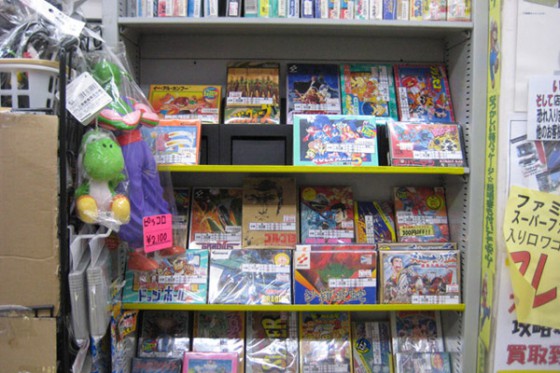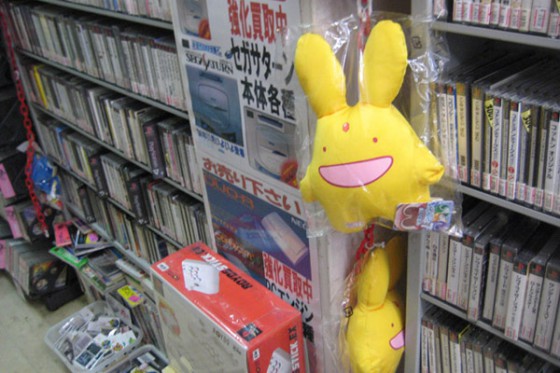| By | mollipen | ||
| Filed Under | Blog, Japan, Video Games | ||
| Tags | akihabara, cartridges, digital distribution |
Coming to Japan makes me hate my position on digital distribution.
That position? I love it, and have argued for and supported the idea of digital distribution for a long time now. Not just the concept of getting our games digitally, mind you—the concept of only getting our games that way.
That isn’t to say that I’m some cruel monster who wants to break into your home at night in order to steal away all of your cartridges and optical discs or anything like that. I am a lover of choice, and the ability of all of us to have that choice. Myself, however, I’ve been switching more and more to the digital side of the media revolution, and boy has it been sweet. Music? Sure, I still own CDs, but they sit in a box in my closet, their only usefulness to me being as back-up should my digital rips meet some unfortunate fate. (And really, I can’t even tell you the last time I purchased a CD.) Movies? I used to shudder in annoyance if my DVDs were anything less than presented on a shelf in their full, pristine original case. Now? The DVDs are stacked one on top of the other on CD spindled, hidden away as I—again—make use of digital versions of those movies streamed to my PS3.
Then, of course, we have video games. Ahh, what a love/hate relationship that one is. I love games, I hate the ownership of their physical manifestations. Okay, so that isn’t fair—I don’t hate it. I grew up as somebody who loved collections, and for years and years I proudly displayed (or kept tucked away yet easily accessible) collections for a wide variety of systems. At some point, however, my collections just became too much. The things I owned, as the saying goes, ended up owning me. Every time I moved, every time I re-decorated, every time I simply wanted a little extra space, there they were, so wonderful and awesome and full of gaming history yet just so there.
Not being much of a PC gamer, I never had much experience with Steam, nor with the “fantabulous digital experience” it supposedly promises. My digital tipping point, instead, came with the PSP—an interesting situation given that its rival, the Nintendo DS, is the one system I now allow myself to have a hardcore collection for.
With more and more PSP games coming out both as a standard physical UMD release and a digital version via PlayStation Network, it was the perfect opportunity to get my feet wet in the digital pool. It felt strange at first; after so many years of buying physical versions of games, spending the same money to get a digital file that’s essentially copied from one place to another didn’t seem right. With that tangible item no longer there to be held in my hands, it was sometimes a little hard to fully appreciate where my money had just gone.
Once I had a few PSP games in that digital form, however, things started to make more sense. With back-up copies safely tucked away on my PS3’s hard drive, I could transfer over as many PSP games as my Memory Stick of choice could carry, giving me a library of titles to choose from and enjoy while no longer needing to also carry an assortment of little disc thingies. It was to gaming as my iPod was to music, and the convenience outweighed any strange internal need to see a case sitting on a shelf collecting dust.
Yet, there I was today in Akihabara, browsing the retro game stores and their wares. I explored shelf upon shelf of cartridges and discs—all belonging to some particular platform now past its prime—and the feeling I felt was… comfort. Indeed, there was a comfort in it all. The games were real, they were tangible, they had existed years ago and they still existed now. Their usefulness had been used up by one gamer, but soon they might be purchased by another, providing that new owner with just as much enjoyment as they had provided to their last. Going into a GameStop back in my home country, it’s hard to look past the store and really see the games. Here, their history and legacy is fully on display, and as somebody who loved video gaming, it’s hard not to be swept up in it all. These stores aren’t selling you a product that will save you $5 versus buying the same game brand new—these stores are selling you the keys to worlds you haven’t explored yet, or tickets to return to the ones you long to visit again.
Being there in Akihabara, visiting those stores, existing among all of those old games and accessories and consoles, it didn’t take long for a thought to crop up: My love for digital distribution means the end to all of this. Not today, not tomorrow, maybe not even a few years from now. At some point with digital distribution, however, gaming’s past ceases to exist in any real way, and the legacy of a particular title or series is reduced to a file sitting on a hard drive somewhere. I can’t go to a store and explore files. I can’t come across files I’ve never heard of before, pick them up, and try to imagine what they might be like from the screenshots on the back of their package. When more and more of our must-have games go digital only, stores like the ones I visited today become a relic of the past, their games and platforms potentially becoming more and more niche as those who grew up with them grow old and move on.
Looking to my right, I can see the stack of seven DS games I purchased today. Sure, they’re a little bulky, and yes, I know that when I get home, my already-overflowing DS shelf will have absolutely no room for them. Had I just booted up my DSi, clicked on the Nintendo Shop, and downloaded those same games (if they were available), it would have been quicker, easier, and more convenient. It also wouldn’t have been nearly as much fun, not felt as rewarding when I found each particular game for a great price.
So yes, I love digital distribution, and all of the positives it can bring us. At the same time, that love makes me feel like a traitor to something I love even more: Video games.
This entry was posted on Wednesday, October 12th, 2011 at 1:31 am and is filed under Blog, Japan, Video Games. You can follow any responses to this entry through the RSS 2.0 feed. Both comments and pings are currently closed.






Hey, put up to G+ again? or at least give this the +1 button, eitherway fallowing your stuff, keep it up.
I have added those fancy social network sharing buttons!
[…] products at Toysrus.com. The leading toy store for toys, educational toys, baby products, and more. Nintendo DS Games | Best BuyShop Online for Nintendo DS Games, Nintendo DS Video Games Nintendo DS G….nintendo.com/">NintendoNintendo's official site | Discover the Nintendo DS portable system, […]
The only thing about digital distribution that makes me uncomfortable is the tendency for content providers to insist on retaining ultimate control over the files I’ve purchased. That tendency ends up manifesting itself as DRM, rules about where/how the files can be stored, and cumbersome encryption. This makes games become almost more of a concept, than a product. Your PSP titles are sitting happily on your PS3’s drive, until the drive or PS3 dies. Sony may have some way of transferring purchases to a new console, but if memory serves, Nintendo does not with the Wii. And what happens when Sony goes out of business, or maybe retires the PS3 or PSP and decides it’s not worth making all or certain of the older games you so love available for digital distribution on a newer system? What if there’s some apocalyptic event and people everywhere are cut off from the internet? Or the internet or digital storage as we understand it changes? Those digitally distributed games will not survive, because they’ve been designed to be non-transferrable and useless without the company that made them intervening to say it’s okay for you to use their precious data.
This tendency is akin to selling me a book typeset in code known only to the publisher, with a key that I can’t keep and I need to ask for every time I want to use it. It feels very wrong.
I will be 100% comfortable with digital distribution when I can download my games unencrypted, without DRM of any kind, and do whatever I feel like doing with the files after purchase.
P.S. If I’m wrong about the digital versions of PSP games, and they’re just normal .ISO files or whatever, then bravo Sony.
My problem with digital distribution is the same as Monkey’s. I can’t stand DRM, which made me hate Valve and their Steam. There’s no point in buying a physical copy of the game if you have to download half of it from Valve’s servers, is there? But that’s another story for another time.
I’m one of those “if I bought it, I’ll keep it” people. Once I purchase a game, it’s unlikely I’ll ever sell it, no matter how bad it is. I wish I could say I’m a collector, but I’m not really sure I qualify. I’ve been buying and playing games for as long as I can remember, so the number of games I own naturally grew. There’s no particular direction in this. I’ll buy everything. I own pretty much all of the home consoles that are worth the attention and same goes for handhelds. This means I still buy games for all of these, from Atari 2600, to WonderSwan, to Xbox 360. Towards the end of the ’90s I started buying arcade hardware as well.
Long story short, I’m low on free space and have been for years, but every once in a while I’ll re-arrange some shelves, pack some more boxes, etc.
When things progress to a point when you have to spend time on planning how to use your space, some people might see the digital distribution as a positive alternative. I still don’t. How do I handle this then? Most of my games for cartridge based systems are kept in boxes, in the basement. I’m a huge homebrew and demoscene fan, so I’ve been using flash cartridges for ages now, and it’s nice to see that many classic systems are getting new flash units, with USB interfaces and SD cards, instead of serial ports, zip drives and all that. In other words, I keep ROM images of the games I own. This way I can simply access any given game and play it. I even use a flash cartridge for Nintendo DS games, just so that I can have several games with me.
With the exception of DS [and PSP, for which you can make your own backups as well] being fairly recent, other systems are dated, so while I don’t have a problem with them anymore, there’s still a question of digital distribution of new games for the Xbox 360, PS3 and Wii. Here’s where things can get a bit tricky. Technically you can make sure all of your digitally downloaded games will last you a lifetime, but for that you’ll need hardware and software modifications. All of this, while morally correct in my view, is illegal. Also, you’d pretty much have to sacrifice a separate Xbox 360 and a PS3 for this.
My point is, there are ways around DRM, but it’s a hassle. It does mean however, that in the unlikely event of Sony going out of business or a global internet failure, you still could play the games you once bought.
Having said that, I’d still like Treasure to release Radiant Silvergun on a disc. Why they didn’t is beyond me. After all, people are paying $200 for it on eBay. Of course they pay for it as a collector’s item not the actual game, but that’s beside the point. Same goes for Cave. I simply refuse to believe they can’t sell their older games and still profit. If selling ESP Ra.De. as one game on a single disc isn’t profitable, make a collection of the older games. No one can resist a good collection, right? Unless it’s another one of those SNK classics type of deals.
So, in conclusion, even though my games and hardware do own me in a way, I’m not switching over to digital distribution until someone thinks it’s a good idea not to have a physical media drive in their new console. I love those colorful manuals and nice boxes. I love all the bonuses and I’m not moving away from that to purchase some ones and zeros.